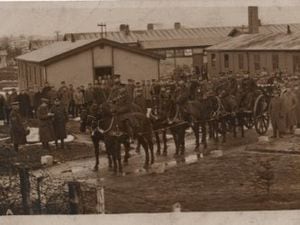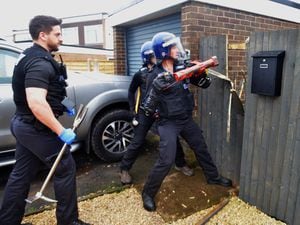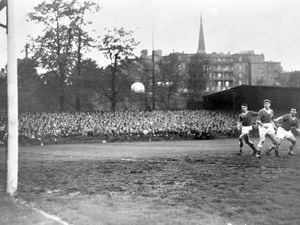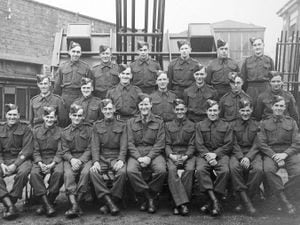How the Iron Lady was nearly floored over a row about helicopters
At the start of 1986, Margaret Thatcher was at the height of her power. Commanding a majority of more than 140 in the Commons, she had built up a reputation as somebody you messed with at your peril.
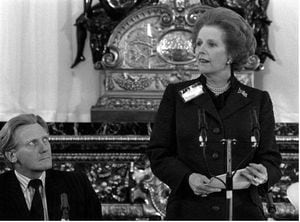
And with his flowing blond locks, and reputation as a formidable orator, her defence secretary Michael Heseltine was the man many tipped to be her eventual successor.
Yet a row over a small helicopter manufactuer based in Somerset, which few outside aviation circles had even heard of, put the two on a collision course which came close to ending both their careers.
It is 35 years ago today that Heseltine furiously resigned from the Government, sparking one of the most infamous feuds in modern political history. The row blew wide open the Conservative Party's divisions over its attitude towards the then European Economic Community, and the breakdown in relations between Thatcher and her former lieutenant would lead to her ultimate downfall five years later. But while former Shrewsbury schoolboy Heseltine may have got his revenge, his actions probably also thwarted his hopes of landing the top job.
What became known as the Westland Affair began in the spring of 1985, when it emerged that the aviation company was in serious financial difficulties. Heseltine, who was responsible for defence procurement, was not unduly concerned, knowing that there were a number of US companies which could provide the British military. But when Westland's new chairman Sir John Cuckney proposed a rescue plan, which would see American rival Sikorsky take a 30 per cent stake in the company, Heseltine became alarmed.
At the time, he said, Sikorsky had been trying to sell its Black Hawk helicopters to the UK, but Heseltine said defence chiefs were adamant they didn't want them. Fearing that if Sikorsky took an interest in Westland it would lead to Black Hawks being manufactured in the UK, he became concerned his department would be put under pressure to buy them.
Having recently negotiated with European leaders on the Eurofighter project, Heseltine called for the Government to facilitate a similar consortium which would see Westland team up with other European manufacturers to design a new helicopter. Such a group would be big enough to rival the US giants, he said, and supply governments across Europe.
"We were looking for a solution, of quite an imaginative nature," he said. "Whereas all the Americans had to do is to say look here’s the helicopter we want you to buy it."
The problem with this was, that for it to go ahead, it would almost certainly have required allowing Westland to go into receivership, so that GEC and British Aerospace – the British part of the consortium – could acquire the viable parts of the business. Unsurprisingly, the Westland directors were not happy about this, and the company rejected Heseltine's proposals in favour of the Sikorsky deal.
By December 1985, Margaret Thatcher was becoming frustrated by the amount of time that was being devoted to relatively small company, and believed that Heseltine was starting to become obsessed with Westland. She insisted it was a matter for the directors of the company, and it was not the Government's place to intervene.
The rift widened when Heseltine wrote a letter to David Home of Lloyds Bank, who had been advising the European consortium, advising him that American involvement would handicap Westland's ability to sell to other governments in Europe, as EEC leaders had agreed a 'buy European' policy. To Thatcher's fury, Heseltine's letter was also leaked to The Times in direct contradiction of the advice she had given. Solicitor-general Patrick Mayhew wrote a letter to Heseltine ordering him to correct 'material inaccuracies' in his letter, and this letter was also leaked to the media, this time on the orders of Trade Secretary Leon Britton.
The cabinet met on January 9, 1986, and Heseltine and Britton were both reported to have exchanged words on the matter. The prime minister reiterated the position previously agreed at cabinet, that the future of Westland was a matter for the company alone, and added that any future questions about Westland should be cleared through the Cabinet Office. This last statement was said to have left Heseltine incandescent with rage, and is said to have replied: "I can no longer be a member of this cabinet", picked up his papers and stormed out of the meeting, breaking news of his resignation to reporters assembled outside Downing Street.
The row festered on for weeks, with claim and counter claim about who had leaked what threatened to engulf the Government. Leon Britton also resigned, having been accused of misleading Parliament, but Thatcher recovered, although the row had left her tainted in the eyes of some as being 'anti-European'.
Some suggested Heseltine had deliberately engineered the row with an eye on replacing Thatcher if she lost the next election, but her landslide victory the following year meant he would have to bide his time. While he never publicly called on Mrs Thatcher to resign, his regular public interviews did little to dampen down speculation that he was jockeying for her job. When asked during the 1989 Conservative Party conference if he would turn down the job of prime minister if it became available, he replied: "Of course not."
On November 14, 1990, the day after Geoffrey Howe sensationally resigned as deputy PM in protest at Thatcher's position on Europe, Heseltine finally pounced and challenged his nemesis for the Tory Party leadership. He lost the first ballot by 54.8 per cent to 40.9 per cent, but polled enough to secure a second ballot – and inflict a mortal wound on his nemesis.
Thatcher announced her resignation the next day, but Heseltine did not claim his crown. He was defeated in the round ballot after Thatcher urged MPs to elect John Major as her successor.

